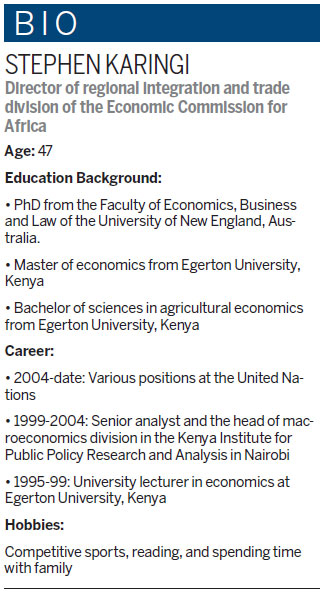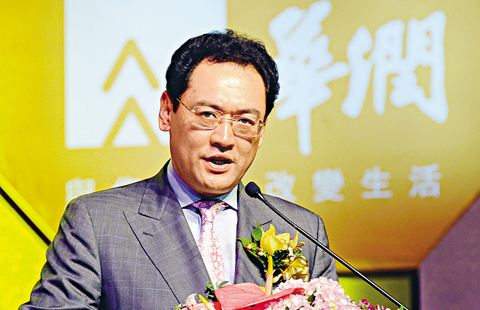
Integration is key to continent's economic advance, expert says
Africa has no choice but to integrate economically, says Stephen Karingi, of the United Nations Economic Commission for Africa. Such a union will help the continent grow rapidly in a generation, something China has managed to achieve, he says.
"Unless it does that, then Agenda 2063 may come to naught," says Karingi, the commission's director of regional integration and trade division. "So as a continent we have no other option."
|
Stephen Karingi says he thinks China has a critical role to play as a result of its increased engagement with Africa. Li Lianxing / China Daily |
Agenda 2063, aimed at developing a plan for African growth for 50 years, was adopted by the African Union last year when it celebrated the 50th anniversary of the founding of the Organization of African Unity.
The continent has been dragging its feet with poor policies, Karingi says, and he sees existing sub-regional trading blocs as the best foundation for pursuing an agenda of bringing countries together.
Blocs such as the East African Community and the Economic Community of West African States have policies that support the free movement of labor, goods, services and capital, he says, and a common-market approach is benefiting countries such as Tanzania that previously had restrictive trade policies, he says.
"But now Tanzania is becoming a major trading partner for both goods and services, particularly if you compare it with a country like Kenya."
Expanding the scope of trade will improve the continent's capacity to compete internationally, he says. Unfortunately, political leaders' decisions have led to the erosion of the continent's value chain.

"We have had instances where a regional bloc decides to follow an integration model that removes tariffs while simultaneously introducing a new industry, like the service sector. That eventually impedes each country's investment flows."
Developing strategies that increase trade among blocs and support infrastructure development brings integration closer, he says. Apart from improving the free movement of people and goods in the continent, this will increase the benefits accrued from natural resources, key to the continent's growth.
"Without that, the benefits of natural resources cannot be maximized because of the high costs of transacting business between countries."
One of the biggest barriers to cross-border trade is the application of tariffs and non-tariff barriers at border points.
These new policies will lead to a transformation in which the proceeds of natural resources are channeled toward education, health and infrastructure development.
Infrastructure is critical in increasing the continent's global trade, Karingi says. He commends the approach some African countries have taken in strengthening their ties with China, saying these relationships are not only improving access to ports and mineral sources but also opening up markets to neighboring countries.
Generally, a lack of infrastructure has acted as a dampener on the ability of governments to add value to their natural resources, he says.
These difficulties were compounded by a colonial agenda under which resources were exported to Europe only. But after independence, countries needed to change, realizing that these natural resources could bring transformation, Karingi says, not only economic but social, too.
"Human capital also needs to be developed," he says, adding that if big changes are to take place, people need to make the most of their natural resources.
The ideal development mode is one that looks beyond quick gains because with conventional methods it is likely that natural resources will continue to be exported in their raw state.








